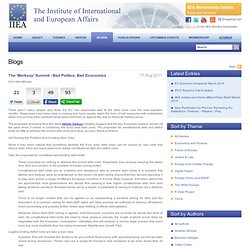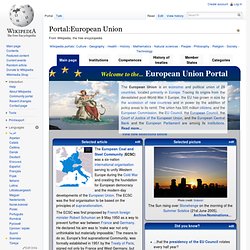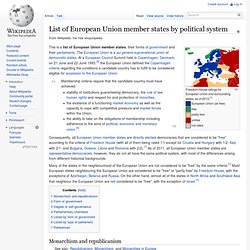

The 'Merkozy' Summit - Bad Politics, Bad Economics. 17 Aug 2011 Prof.

Karl Whelan There aren’t many people who think the EU has responded well to the debt crisis over the past eighteen months. Responses have been slow in coming and have usually taken the form of half measures with substantive steps only arriving when political backs were slammed up against the wall by financial market panics. The proposals emerging from the latest Merkel-Sarkozy meeting suggest that the key European leaders remain off the pace when it comes to containing the Euro area debt crisis. Not Solving the Problem and Creating New Ones While it may seem natural that something labelled the Euro area 'debt crisis' can be solved by new rules that reduce debt, there are many reasons to dislike constitutional debt and deficit rules.
Take the proposals for constitutionally-binding debt limits: These proposals do nothing to address the current debt crisis. Constitutional debt limits are an unwieldy and dangerous way to prevent debt crises. Summaries of EU legislation.
Directives. Tien speerpunten van het euro-realisme. EU_OCT_and_OMR_map_en.png (2206×1358) Writing for (y)EU. Glossary. Portal:European Union. From Wikipedia, the free encyclopedia Welcome to the...

European Union Portal The European Coal and Steel Community (ECSC) was a six-nation international organisation serving to unify Western Europe during the Cold War and creating the foundation for European democracy and the modern-day developments of the European Union. The ECSC was the first organisation to be based on the principles of supranationalism. The ECSC was joined by two other similar communities in 1957, with whom it shared its membership and some institutions. WikiMiniAtlas 56°58′N 24°8′E / 56.967°N 24.133°E / 56.967; 24.133. The modern founding of Riga is regarded by historians to have begun with the arrival in Latvia of German traders, mercenaries and religious crusaders in the second half of the 12th century, attracted by a sparsely populated region, potential new markets and by the missionary opportunities to convert the local population to Christianity. Member states' portalsedit.
List of European Union member states by political system. Freedom House ratings for European Union and surrounding states, as of 2013.[1] European Union (all free) free partly free unfree not rated This is a list of European Union member states, their forms of government and their parliaments.

Consequently, all European Union member states are directly elected democracies that are considered to be "free" according to the criteria of Freedom House (with all of them being rated 1/1 except for Croatia and Hungary with 1/2, Italy with 2/1, and Bulgaria, Greece, Latvia and Romania with 2/2).[1] As of 2011, all European Union member states are representative democracies; however, they do not all have the same political system, with most of the differences arising from different historical backgrounds. Monarchism and republicanism Form of government Degree of self-governance Parliamentary chambers Listed by form of government. Www.international.gc.ca/trade-agreements-accords-commerciaux/assets/pdfs/EU-CanadaJointStudy-en.pdf.
Welcome to the Publications Office. EUR-Lex. How to Become a Member of the European Parliament. How Does the European Union Work? Politics of the European Union. The politics of the European Union are different from other organisations and states due to the unique nature of the European Union (EU). The EU is similar to a confederation, where many policy areas are federalised into common institutions capable of making law; however the EU does not, unlike most states, control foreign policy, defence policy or the majority of direct taxation policies (the EU does limit the level of variation allowed for VAT).
These areas are primarily under the control of the EU's member states although a certain amount of structured co-operation and coordination takes place in these areas. For the EU to take substantial actions in these areas, all Member States must give their consent. The common institutions mix the intergovernmental and supranational (similar to federal) aspects of the EU. The EU treaties declare the EU to be based on representative democracy, and direct elections take place to the European Parliament. Legal basis[edit] Article 10 *1. Law[edit]